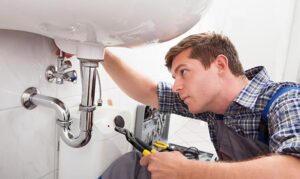Plumbing involves the installation, maintenance and repair of pipes, fixtures and appliances. It is crucial to any building and ensures the health and safety of its occupants. Contact Hubbard Mechanical now!
It is a highly technical job that requires extensive training and hands-on experience. It is also a physically demanding job, as plumbers often work in awkward and cramped spaces.

A home’s plumbing system delivers fresh water into the house and takes wastewater out. It comprises two separate subsystems that work together: the water supply and the drain-waste-vent (DWV).
A house’s water supply line connects to a public main water pipeline, typically located under the street. The line may also tap into a private well. From there, it branches out to carry freshwater to sinks, toilets, showers, appliances like washing machines and water heaters, and more.
The water in the supply lines is under pressure, ensuring that it travels quickly to all areas of the house. This helps prevent scalding and minimizes the risk of accidents caused by sudden burst pipes. A meter measures the amount of water used, and a main shut-off valve is located close by in case of an emergency.
Water supply systems typically consist of water pipes, fittings and service valves, which are usually made of copper, brass, galvanized iron or plastic. They range in diameter from about half an inch to 4 inches or more. The system also includes faucets, which control the flow of water to each fixture.
Over time, these systems can become contaminated with microorganisms and bacteria. In particular, biofilm—a slimy, glue-like substance that forms in warm, wet environments—can grow on the inside of pipes and release bacteria into household water. This can lead to illness such as Legionnaires’ disease.
To prevent these problems, experts recommend regularly inspecting and maintaining the plumbing system, especially the water supply lines. These lines are vulnerable to leaks, which are often caused by corrosion or loose joints. They are also at risk of being damaged by tree roots or by stray underground electrical currents.
In addition to the water supply system, a home also has a drainage system that carries away sewage and wastes from sinks, toilets, showers, bathtubs, dishwashers and washing machines. This system consists of a network of pipes, traps and vents that carry these contaminants to public sewers or septic tanks. Unlike the supply pipe system, which is pressurized, the drainage system is not. This makes it important to regularly check and maintain the system to ensure that it is not clogged with debris, which can cause wastewater to back up into the house.
Drainage systems in your home transport used water away from your fixtures, such as sinks, toilets and showers. They also carry wastewater and waste from your house to the sewer system, which carries it to the sewage treatment plant. The drainage system works solely by gravity and does not require any pressure to work.
The main parts of your drainage system are the pipes, traps and vents. Most of them are well hidden under our sinks or behind walls and floors, but being familiar with which ones are in charge of what may save you some time, effort and potentially money in the long run.
Your household drainage system is based on a series of piping that connects your home’s plumbing fixtures to the sewage system. The piping is typically made of concrete, metal or PVC. The pipe network runs throughout your property on an incline, so water will flow away from your home naturally. The system can be further divided into two categories — surface and subsurface drainage.
Surface drainage is for rainwater that falls on your property. It includes gutters, patio drains and sportsfield drains. It may be connected to the sewage or directed to a soakaway or river. The septic tank is another option for this type of drainage system, but it’s usually separate from your house plumbing.
Subsurface drainage is for soil that contains a lot of water. It may include French drains or perforated pipes installed in a trench. They help to remove excess water from the ground, allowing natural aeration of the soil and plant respiration.
Most of your drains are sealed with a trap that prevents the odor of waste from spreading inside your home. A p-trap is a curved section of pipe shaped in the letter “P” or “U.” It’s located immediately after each fixture drain and holds standing water that seals the drain.
Sewage disposal systems remove human waste from homes and businesses. A toilet’s flush mechanism pushes wastewater and faeces through pipes into a sewage system, which may be located underground or on the surface of the ground. Eventually, the waste becomes sludge or scum, which sinks to the bottom and decomposes. The liquid that remains is called effluent. The sewage system can be situated close to the house, in which case it’s referred to as a decentralized system or on-site sewage system, or it can be transported by a network of pipes and pump stations to a municipal treatment plant, which is a centralized system.
Before sewage can be discharged, it must be treated to control water pollution. The most common way to treat sewage is in a sewage treatment plant, where it’s aerated to help the solids settle out of the wastewater. Chemicals are added to break down organic matter and reduce the amount of hydrogen sulfide gas that’s produced. Aeration also helps the sewage separate into its components so that the heavier solids can be removed in a settling tank, while the liquid effluent flows out through perforated pipes to drain fields or other sites for disposal.
An older method of treating sewage was in a cesspool, which is an underground receptacle for wastewater from residential or commercial buildings. A cesspool is similar to a septic tank, but it’s much bigger and has a porous bottom that lets the liquid waste filter into the soil while holding solid debris until it can be cleaned out. The result is a mixture of sludge and effluent that’s sometimes used for fertilizer or landfill.
In many areas with low population densities, sewage is not conveyed in sewers, but is stored in on-site sanitation systems. These include septic tanks connected to drainage fields, on-site sewage systems, vermifilter systems and other alternatives. Such systems are more appropriate in rural areas, where sewage is less likely to pollute groundwater and the surrounding environment. If a large number of people all use the same sewage treatment system, however, it becomes more important to convey sewage to a central facility for processing.
Plumbing includes the distribution of water and the removal of waste. It also provides heating and cooling systems for buildings. It involves a complex network of pipes, valves, fittings, and fixtures that convey water, steam, and air to different parts of the building.
Plumbers install, repair, and maintain these systems in homes and commercial buildings. They must be familiar with the design and construction of these systems, as well as state and local codes and regulations. They must also be skilled at soldering and brazing, reading blueprints, and using hand and power tools. They must also be able to identify and locate leaks.
Most plumbing jobs require a significant amount of physical labor. They often involve lifting heavy objects and working in tight spaces. They may also be exposed to hazardous materials. Plumbers must be comfortable working in these conditions and improvising when necessary. In addition, they must be able to work under pressure and meet deadlines.
Despite the challenges, there are many benefits to becoming a plumber. For example, the career offers a high salary and good job security. In addition, plumbers can choose to be self-employed and have flexible schedules. However, the occupation requires a substantial investment in training and equipment.
The main role of a plumbing system is to provide potable water in residential and commercial buildings. The system also removes sewage and other waste products and transports them to treatment plants. It is important to have a functioning plumbing system in order to prevent health hazards and environmental pollution. In addition, a functioning plumbing system will save money on energy bills.
